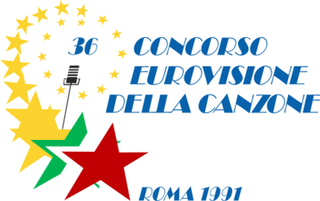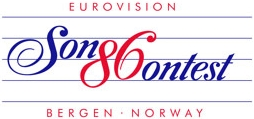
The Eurovision Song Contest 1991 was the 36th edition of the annual Eurovision Song Contest. It took place in Rome, Italy, following the country's victory at the 1990 contest with the song "Insieme: 1992" by Toto Cutugno and was organised by the European Broadcasting Union (EBU) and host broadcaster Radiotelevisione Italiana (RAI). The contest was held at Studio 15 di Cinecittà on 4 May 1991 and was hosted by former Italian winners Gigliola Cinquetti and Toto Cutugno.

The Eurovision Song Contest 1986 was the 31st edition of the annual Eurovision Song Contest. It was held in Bergen, Norway, following the country's victory at the 1985 contest with the song "La det swinge" by Bobbysocks! Organised by the European Broadcasting Union (EBU) and host broadcaster Norsk rikskringkasting (NRK), the contest was held at Grieghallen on 3 May 1986 and was hosted by previous Norwegian contestant Åse Kleveland.

The Eurovision Song Contest 1988 was the 33rd edition of the annual Eurovision Song Contest. It took place in Dublin, Ireland, following Johnny Logan's win at the 1987 contest with the song "Hold Me Now". Organised by the European Broadcasting Union (EBU) and host broadcaster Radio Telefís Éireann (RTÉ), the contest was held at the RDS Simmonscourt on 30 April 1988 and was hosted by Irish broadcaster Pat Kenny and the Miss Ireland 1980 Michelle Rocca, marking the first time since the 1979 contest that two presenters had hosted the contest.

The Eurovision Song Contest 1981 was the 26th edition of the annual Eurovision Song Contest. It took place in Dublin, Ireland, following Johnny Logan's win at the 1980 contest in The Hague, Netherlands with the song "What's Another Year". The contest was held at the RDS Simmonscourt on 4 April 1981, and was hosted by Irish television journalist Doireann Ní Bhriain.
The United Kingdom participated in the Eurovision Song Contest 1988 with its entry "Go" performed by Scott Fitzgerald and written by Julie Forsyth. The song was chosen through the "A Song for Europe" national final which consisted of eight songs in 1988. At the Eurovision Song Contest 1988, Fitzgerald and his song was placed second with 136 points.
Yugoslavia made their penultimate Eurovision entry in the Eurovision Song Contest 1991, held in Rome, Italy.
Belgium was represented by Reynaert, with the song "Laissez briller le soleil", at the 1988 Eurovision Song Contest, which took place in Dublin on 30 April. Reynaert was the winner of the Belgian national final for the contest, held in Brussels on 27 February.
Germany was represented by Lena Valaitis, with the song "Johnny Blue", at the 1981 Eurovision Song Contest, which took place on 4 April in Dublin. "Johnny Blue" was the winner of the German national final, held on 28 February. Valaitis had previously taken part in the German final in 1976.
Denmark was represented by Hot Eyes, with the song "Ka' du se hva' jeg sa'?", at the 1988 Eurovision Song Contest, which took place on 30 April in Dublin. "Ka' du se hva' jeg sa'?" was chosen as the Danish entry at the Dansk Melodi Grand Prix on 27 February. This was the last of three Eurovision appearances for Kirsten and Søren.
Ireland was represented by Linda Martin, with the Johnny Logan-penned song "Terminal 3", at the 1984 Eurovision Song Contest, which took place on 5 May in Luxembourg City. "Terminal 3" was chosen as the Irish entry at the national final on 31 March.
Finland was represented by Riki Sorsa and the song "Reggae OK" at the 1981 Eurovision Song Contest, which took place on 4 April in Dublin. Sorsa won the rights to represent Finland on the 21 February.
Switzerland was represented by Carol Rich, with the song "Moitié, moitié" at the 1987 Eurovision Song Contest, which took place on 9 May.
Switzerland was represented by the group Rainy Day with the song "Welche Farbe hat der Sonnenschein?" at the 1984 Eurovision Song Contest, which took place in Luxembourg City, Luxembourg on 5 May. Rainy Day won the rights to represent Switzerland, from winning the national final that took place on 4 February 1984. In the song is made a question: "What colour is the sunshine?". The group ask us "How to paint it?" They say that there are many colours, the way we see the world depends on our feelings. It was the last song of the german composer Günther Loose.
Turkey was represented in the Eurovision Song Contest 1988 by a music trio named Mazhar Fuat Özkan with the song "Sufi", written and composed by the trio.
Yugoslavia was present at the Eurovision Song Contest 1981, held in Dublin, Ireland, after last participating at the Eurovision Song Contest 1976 contest in The Hague, Netherlands.
Yugoslavia took part in the 1983 Eurovision Song Contest held in Munich, West Germany. It was represented by Daniel who sang Džuli.
Yugoslavia participated at the Eurovision Song Contest 1987, held in Brussels, Belgium. It was represented by song "Ja sam za ples", performed by band Novi fosili. The selection process used a revised system for nominations and scoring. In the Contest itself the song was ranked fourth out of 22, winning 92 points.
Israel was present at the 1988 Eurovision Song Contest held in Dublin, Ireland. They were represented by Yardena Arazi with the song "Ben Adam".
Iceland was represented at the Eurovision Song Contest 1988 by Beathoven with the song "Þú og þeir (Sókrates)". Beathoven was the winner of the Icelandic national final, Söngvakeppni Sjónvarpsins 1988, organised by Icelandic broadcaster Ríkisútvarpið (RÚV).
Yugoslavia was present at the Eurovision Song Contest 1971, held in Dublin, Ireland.



